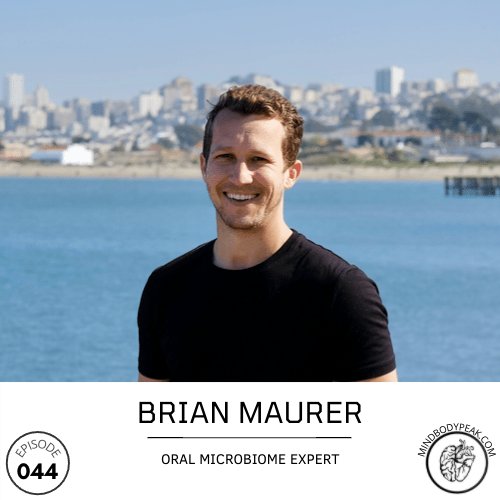
The cleanest, pasture-raised, biodynamic, grass-fed, organic food won’t do an unhealthy mouth much good. Even before digestion, with every bite, pathogens can enter the bloodstream through infected gums. Increasing permeability of the blood-brain barrier and leading to neuroinflammation.
Brushing and flossing are a good start. But our one or two annual trips to the dentist puts us in reactive mode. Holistic health is about prevention, so why should oral care be any different? What my mouth needs will differ from yours. That’s where Bristle can help.
Podcast Sponsor Banner
About Brain Maurer
Brian Maurer started his career in genomics, at the DNA sequencing company Illumina. There he was on the ground floor of the genomics revolution that is taking place in healthcare and beyond. Brian got to work with some of the most cutting-edge scientists and companies innovating in areas like oncology, synthetic biology, CRISPR, and more. He co-founded Bristle a year ago with the mission of leveraging genomics technology to fundamentally change how we understand and practice oral health.
Top things you’ll learn from Brian Maurer
- Recent developments in circadian science
- The rise of at-home health diagnostics
- The oral microbiome is a potential entry point for pathogens that we expose ourselves to with every bite
- Few diagnostic tools focus on the oral microbiome
- 6 month dentist appointment only tracks symptomology and progressed form of disease
- Oral health should never have been separated from the rest of healthcare
- The importance of the oral microbiome
- Diabetes, heart disease, alzheimers are diseases of inflammation that often begin in the mouth
- “Brush and floss more” isn’t useful advice and needs personalization
- RNA sequencing tech is teaching us about microviomes of the body
- Oral microbiome is the second largest in the body, only behind the gut
- Well understand causal relationship with disease
- How DNA sequencing works
- Shotgun sequencing technology
- Helps understand how microbes alter metabolic functions
- Oral diseases are the most common in the world
- 90% of Americans have one or more cavities
- ~47% have some form of gum disease which correlates highly with systemic disease
- How pathogenic microbes cause disease
- Biolfilm turns into plaque
- Pathogens use biofilm to persist and “hide”
- Scientific approach to improving oral care
- 9/10 adults brush their teeth incorrectly
- Hold toothbrush at 45-degree angle
- Use soft bristles
- Wait 30 mintes after eating to brush (otherwise you may damage your enamel)
- Mouthwash can negatively impact oral microbial composition
- Xylitol mouth rise can help
- Argining toothpaste inhibits plaque formation
- 9/10 adults brush their teeth incorrectly
- Most oral microbes are actually beneficial
- Perform useful roles like helping fighting infection, stimulating digestion, producing vitamins
- Saliva is good
- Powerful anti-microbial defense and helps speed up wound healing
- Mouth breathing and medications that cause dry mouth may be more dangerous than we realize
- Oral disease is about the relative abundance of different species
- Bristle scores your oral health, breakdown of species, and ideal treatments
- How their recommendation system works
- Healthy fluoride alternatives
- Nanohydroxyapatite toothpaste
- Arginine toothpaste
- The future of synthetic biology
Resources mentioned
- Gear: Arginine toothpaste
- Teacher: Paul Graham
- Teacher: David Goggins
- Album: In Color
- Tool: SelfDecode to determine genetic susceptibilities and predict how certain vitamins, supplements, and drugs will work (see my review here)
Connect with Bristle Health
This podcast is brought to you by
Nick Urban is a Biohacker, Data Scientist, Athlete, Founder of Outliyr, and the Host of the Mind Body Peak Performance Podcast. He is a Certified CHEK Practitioner, a Personal Trainer, and a Performance Health Coach. Nick is driven by curiosity which has led him to study ancient medical systems (Ayurveda, Traditional Chinese Medicine, Hermetic Principles, German New Medicine, etc), and modern science.

Music by Luke Hall
Subscribe to MBPP!
What did you think about this episode? Drop a comment below or leave a review on Apple Music to let me know. I use your feedback to bring you the most helpful guests and content.




